Rugby World Cup rewind: Mandela, Lomu and more Wales woe - the story of 1995
- Published
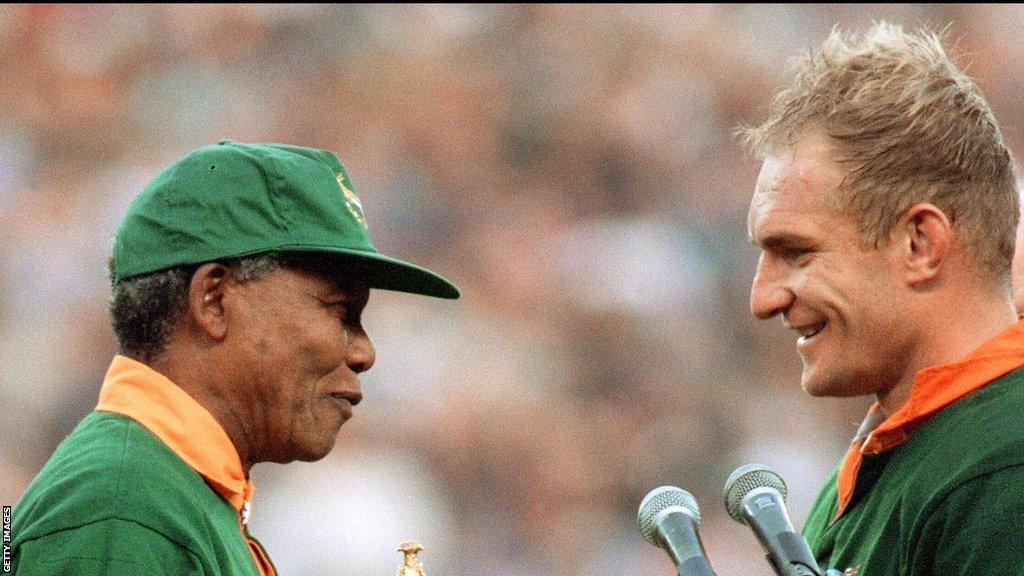
Nelson Mandela presented Francois Pienaar with the rugby union World Cup in 1995 at Ellis Park, Johannesburg
The 1995 World Cup in South Africa changed the outlook of the tournament forever.
It was the first time the tournament attracted global attention with Nelson Mandela wearing the Springbok shirt and presenting the trophy to South Africa captain Francois Pienaar, providing iconic images which were beamed across the world.
The competition also witnessed Jonah Lomu's emergence as a sporting superstar. For Wales, though, it was simply another failed campaign following yet another troubled build-up.
In the latest in a series reflecting on past World Cups, BBC Wales Sport looks back to 1995 with captain Mike Hall.
New hosts
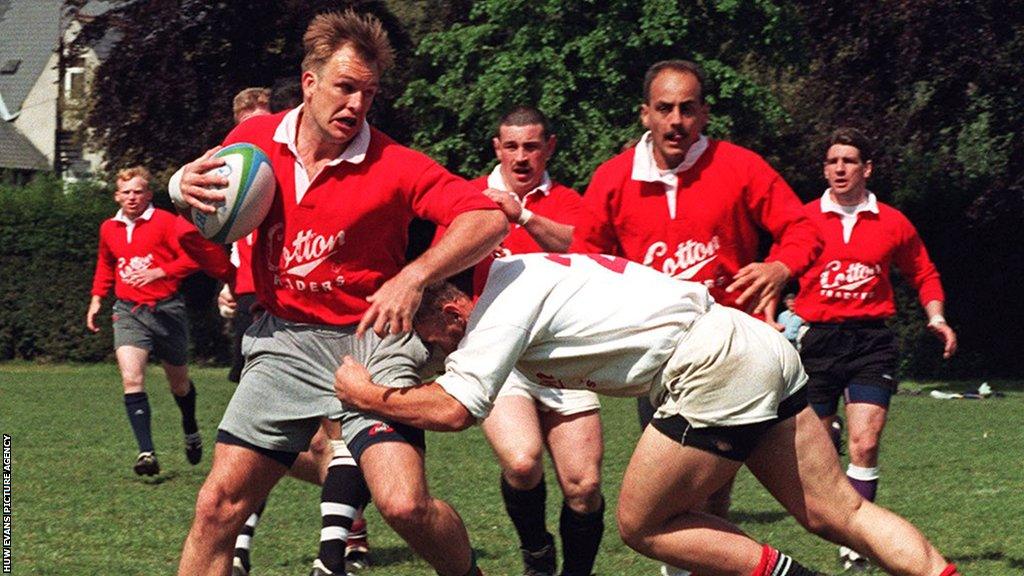
Mike Hall, pictured during Wales training in 1995, played 42 internationals for Wales and went on the 1989 British and Irish Lions tour
The World Cup was the first major sporting event to take place in South Africa following the end of apartheid.
It was also the first global rugby tournament the Springboks were allowed to compete in, with South Africa only readmitted to the international game in 1992.
After their 1991 group elimination, Wales had to qualify for the tournament for the only time in their history - which they managed easily with convincing victories against Spain and Portugal.
Having taken over just before the 1991 tournament, coach Alan Davies helped turn Welsh fortunes around, with Wales winning the 1994 Five Nations title.
Wales' traditional pre-World Cup disruption was not far around the corner, though. A 1995 Five Nations whitewash resulted in Davies being sacked just two months before the World Cup began.
So they turned to Cardiff's Australian coach Alex Evans, who became the first non-Welshman to coach Wales having transformed the Arms Park side. Cardiff centre Hall was appointed the new captain, replacing Ieuan Evans.
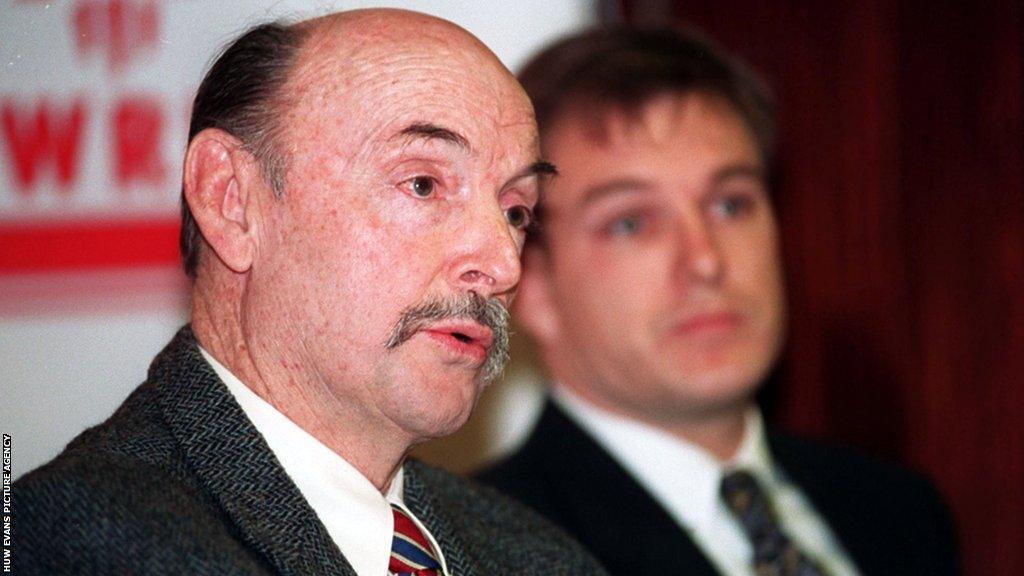
Wales coach Alec Evans at the 1995 World Cup squad announcement with Mike Hall in the background
"Who sacks a coach and manager that had recently won the Five Nations and just before a World Cup? Wales," said Hall.
"Alan and Bob [Norster, Wales team manager] were building something. Davies turned around Welsh rugby in the early 1990s by creating this club atmosphere and we won the 1994 Five Nations.
"Alan was trying hard to make the game more professional and get more time with all the players who were still working.
"You had this stand-off between Vernon Pugh (WRU chairman) and Alan, who was pushing for change, and they fell out when previously they had been quite friendly.
"In the 1995 Five Nations we also had a lot of injuries. So we did our usual thing in Wales where we reverted to type and went back to a successful club coach, like they had with Ron Waldron before."
Evans was assisted by Mike Ruddock and Dennis John, who were associated with Swansea and Pontypridd respectively, and the different factions within the World Cup squad presented problems.
"Club rugby mattered back then," said Hall.
"There were big powerful clubs like Swansea, Cardiff, Pontypridd, Llanelli and Neath all vying with each other and there was a huge amount of competition.
"It was well known Cardiff and Swansea did not like each other. Going into the World Cup with Alex having taken over, there were a lot of Cardiff players so that created a rift even before we got on the plane.
"Alex was a brilliant coach but he had time with the Cardiff players. When he came into the club he liked a certain type of player to play and it took him a year or two to get rid of some of those he didn't want and bring in his own staff to mould the team how he wanted it.
"When it came to the Wales team, he had help from Dennis and Mike in picking the squad and it was a tricky time with the different dynamics going on at the clubs and trying to achieve something so quickly.
"He trusted me as his captain at Cardiff. We had been successful so he wanted somebody to deliver his message. I don't think he managed to get that message across, especially to the other club boys, they weren't that interested.
"So there was unrest going into the tournament. We have this unique ability in Wales to put ourselves in these holes and then remonstrate with each other.
"Trying to get a team to be focused in a different way with that limited time period, when I think about it now, we were on a hiding to nothing and maybe doomed from the start."
Winning start
Wales faced Japan, New Zealand and Ireland in the group stages in South Africa.
The opening match was against Japan, where Wales claimed a 57-10 win which included a hat-trick of tries for Gareth Thomas on his debut.
"It was a good start," said Hall.
"It was a tough game and winning by that margin took a lot out of us. We had a good build-up and trained hard so were fit while we were there."
The All Blacks followed in Johannesburg and the small matter of new teenage wing sensation Lomu.
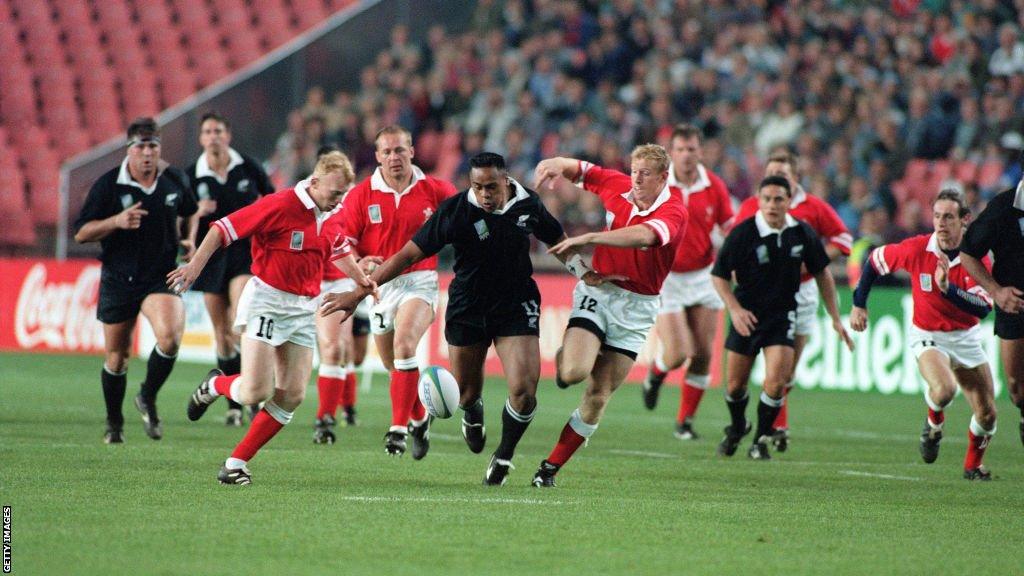
Jonah Lomu being chased by Gareth Thomas and Neil Jenkins during Wales' World Cup defeat against New Zealand
Hall believes Wales did not help themselves prior to kick-off.
"There was one moment in the build-up and the team manager Geoff Evans had been down to Ellis Park the day before when the All Blacks were doing some lineouts on the pitch," said Hall.
"Wales were meant to go on the pitch before the game and he had them thrown off. He came and knocked on my hotel door and woke me up and said 'we have won the first round, I have thrown the All Blacks off the field' and then told me the story. I was thinking oh my god, what have you done?
"When I was shaking hands before the game for the toss with New Zealand captain Sean Fitzpatrick in the bowels of Ellis Park, he said to me 'thank your team manager for doing my team-talk'.
"They were a brilliant side and, for me, they should have won that World Cup because they were the best team in the tournament.
"The only good thing is Jonah Lomu did not score in that game. We knew of him and that he was a fantastic player. They also had 14 other players and I was more worried about Frank Bunce."
Wales might have stopped Lomu from scoring, but he made an impression. Number eight Emyr Lewis was an unused replacement that night.
"Before the tournament started I remember going to the welcome dinner and looking across and seeing this massive young guy who I just assumed was a second-row," said Lewis.
"He was enormous and I had never seen anything like it in my life.
"I was on the bench and sitting on the touchline when Jonah got the ball in his own 22. The ground was hard and you could hear his feet pounding on the ground as he went passed. I was glad I wasn't playing."
A 34-9 loss to New Zealand left Wales with a straight shootout against Ireland to qualify for the quarter-final at Ellis Park. Wales suffered a 24-23 defeat after never recovering from a terrible start and their World Cup was over.
"What an awful game," said Hall.
"We had an awful start and our tactics didn't work. Ireland did not play that well either, it was a complete scrap.
"All I can remember is being out on my feet for the last 20 minutes. We had played three games in a week and it was tough.
"Alan and Bob had this plan where they were going to use two squads for our time in South Africa because we were playing three internationals in a short time. All that went out the window when they got rid of Alan.
"I didn't want to come home after because it was such a crushing disappointment not to qualify."
Iconic images
The tournament continued without Wales, with the New Zealand juggernaut rumbling on and Lomu producing a demolition job of England in the semi-finals, with four tries which resulted in Will Carling labelling him a 'freak'.
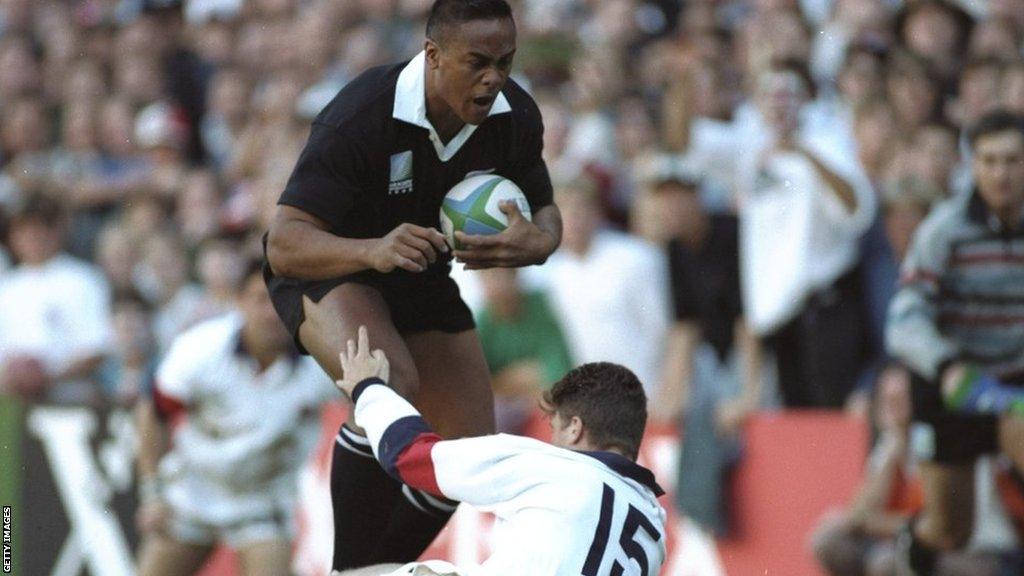
Jonah Lomu runs over the top of England's Mike Catt in his famous 1995 World Cup try
Controversy reigned before the final against South Africa with questions raised as to whether New Zealand players had been affected by food poisoning.
What followed was a famous home triumph thanks to a Joel Stransky extra-time drop-goal.
The occasion was dominated by President Mandela wearing the green jersey of the home side to greet victorious captain Francois Pienaar.
While South Africa was still fractured, Mandela's gesture of reconciliation and attempt to cross the cultural divide made waves around the world.
"The tournament was fantastic," recalled Hall.
"It is a proper rugby nation and they are passionate about it. Few rugby countries can match that, where they are the lifeblood of the country and they embraced it.
"What happened with Nelson Mandela and Francois Pienaar was iconic.
"Overall, it was a huge event and that set the standard for the tournament becoming a global event. It put the tournament on the map as a major event."
The World Cup was the last major competition of rugby union's amateur era. Two months after South Africa lifted the trophy, the International Rugby Football Board opened the sport to professionalism.
In the same year Wales bowed out in South Africa, the rugby league squad, full of former union stars who had switched codes, led by Jonathan Davies, reached the World Cup semi-finals.
"The biggest thing people might not realise was the state of rugby at that time," said Hall.
"In the build-up and during the World Cup, Kerry Packer was trying to take over the sport and myself and the other captains were negotiating with him.
"There were things going on behind the scenes, it came to a crescendo when the game became professional. That's why 1995 was so important."
Mike Hall's predictions for 2023
Where will Wales finish? Quarter-finals
Winners? France, New Zealand or Ireland.